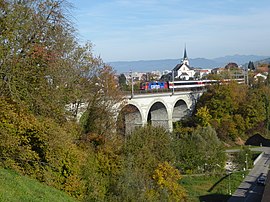Rorschach – St. Gallen
| Rorschach – St. Gallen | |||||||||||||||||||||||||||||||||||||||||||||||||||||||||||||||||||||||||||||||||||||||||
|---|---|---|---|---|---|---|---|---|---|---|---|---|---|---|---|---|---|---|---|---|---|---|---|---|---|---|---|---|---|---|---|---|---|---|---|---|---|---|---|---|---|---|---|---|---|---|---|---|---|---|---|---|---|---|---|---|---|---|---|---|---|---|---|---|---|---|---|---|---|---|---|---|---|---|---|---|---|---|---|---|---|---|---|---|---|---|---|---|---|
|
Goldach Viaduct with Eurocity Munich – Zurich
| |||||||||||||||||||||||||||||||||||||||||||||||||||||||||||||||||||||||||||||||||||||||||
| Timetable field : | 880 | ||||||||||||||||||||||||||||||||||||||||||||||||||||||||||||||||||||||||||||||||||||||||
| Route length: | 15.1 km | ||||||||||||||||||||||||||||||||||||||||||||||||||||||||||||||||||||||||||||||||||||||||
| Gauge : | 1435 mm ( standard gauge ) | ||||||||||||||||||||||||||||||||||||||||||||||||||||||||||||||||||||||||||||||||||||||||
| Power system : | 15 kV 16.7 Hz ~ | ||||||||||||||||||||||||||||||||||||||||||||||||||||||||||||||||||||||||||||||||||||||||
| Maximum slope : | 22 ‰ | ||||||||||||||||||||||||||||||||||||||||||||||||||||||||||||||||||||||||||||||||||||||||
|
|||||||||||||||||||||||||||||||||||||||||||||||||||||||||||||||||||||||||||||||||||||||||
The Rorschach – St. Gallen is a standard gauge railway line in the Swiss canton of St. Gallen and belongs to the Swiss Federal Railways (SBB).
The 15-kilometer route was opened by the St. Gallisch-Appenzell Railway on October 25, 1856 and, with the exception of the tunnel between St. Gallen and St. Gallen St. Fiden and slight smoothing of the arches, has the original route. The route leads from Rorschach Hafen station to St. Gallen, and made a hairpin in Rorschach.
history
The line was built by the Sankt Gallisch-Appenzell Railway. About a year after the opening of the first section, the Rorschach Hafen - Rorschach - St. Gallen line was inaugurated on October 25, 1856. This route through the Steinach Valley was very complex, because around 250 meters in altitude had to be overcome on this section of the route.
When the railways were nationalized on July 1, 1902, the line became part of the Swiss Federal Railways. On May 15, 1927, electrical operation between Winterthur and Rorschach began with 15 kilovolt 16 16 Hertz.
The section between St. Gallen HB and St. Gallen St. Fiden was originally open, but only had a single track. The track lay in a cut that was crossed by several passages and bridges. With the construction of the Bodensee-Toggenburg Railway , an overload of this section of the route was foreseeable. So it was decided to relocate the route underground, as an open double-track route was not considered feasible. As a result, the St. Gallen train station was also rebuilt and relocated. The line with the 1466-meter-long, double-lane Rosenberg tunnel was put into operation on April 1, 1912.
In the Steinachtal in the Galgentobel there is a crawl slope that the railway line crosses. This led to business interruptions several times. After the slope slipped again in early summer 1975, an emergency bridge had to be built in summer 1975. As a result, this section should be bypassed over a new bridge. This project envisaged the expansion as a double track. A 568 meter long bridge was therefore built on the valley side. The prestressed concrete bridge has ten pillars. The second track was initially not laid. The endurance test on April 4, 1982 took place with twelve Ae 6/6 . The bridge bent by 15 millimeters, which corresponded to the calculated values. The bridge was then opened to traffic.
The double lane expansion in the direction of Mörschwil was only carried out after the bridge was built and inaugurated. In 1982 a double-track island was created between Mörschwil and the newly created service station in Engwil. This situation remained unchanged until 1994, when the Mörschwil – Horchental section was converted to a double track. In 2001 the Rorschach-Stadt train station was opened.
Since the turn of the millennium, the Rorschach Stadt - St. Gallen St. Fiden line has been completely expanded to double track. In 2007 the Horchental - Goldach section was opened, and in 2011 the section between St. Gallen St. Fiden and Engwil. The last section between Goldach and Rorschach will follow from January 2019 to May 2020. The existing track of the new double-track section will then be renewed by summer 2021. As part of the railway expansion package 2035, the last single-track section from Rorschach to Rorschach Stadt is to be provided with a second track.
business
In local traffic, the route is used by lines S 2, S 3 and S 4 of the St. Gallen S-Bahn . The InterRegio 13 and the Eurocity Zurich – Munich run on it for long-distance traffic .
The railway line is used by around 110 passenger and ten freight trains on working days. This makes it one of the most heavily used railway lines in Switzerland among the single-track or partially single-track routes.
Ditch cellar
After the Rosenberg Tunnel went into operation , large parts of the old railway line were filled in. One part served as a siding from St. Fiden train station to the slaughterhouse for several decades. The section in front of the Graben schoolhouse, which was demolished in 1971, was covered and turned into the so-called Grabenkeller. Initially, the 134.5-meter-long structure , located under the roadway of the Lower Grave , served a local wine merchant as a warehouse. When the wine merchant moved out in 1951, the city fire brigade used the grave cellar as a training facility until 1983. Today the facility is orphaned and is only used as a route for district heating lines.
literature
- Heer, Anton: Rorschach-St.Gallen-Winterthur: between 170 years of railway history and the future . Sabon-Verlag GmbH, St. Gallen 2006, ISBN 978-3-907928-55-4 ( PDF )
- Hans G. Wägli: Swiss Rail Network . AS Verlag, Zurich 1998, ISBN 3-905111-21-7 .
- Hans G. Wägli: Railway Profile Switzerland 2005 . Diplory Verlag, Grafenried 2004.
Individual evidence
- ↑ EA 1/78 page 17
- ↑ EA 5/82 page 318
- ↑ SER 04/1982 page 123 Fig. 126-127
- ↑ Railway line between Goldach and Rorschach Stadt is being expanded to double track for CHF 23.3 million. In St. Galler Tagblatt (online) on December 14, 2018
- ↑ It starts with the construction of the double-track railway line in Rorschach. In St. Galler Tagblatt (online) on January 5, 2019
- ↑ Christoph Zweili: The third yes: The double-track expansion in Rorschach is within reach. In St. Galler Tagblatt (online) on May 15, 2019
- ↑ Sandro Büchler: Forgotten railway tunnel: The ghost train under St.Gallen. In: St. Galler Tagblatt (online) from September 5, 2018





